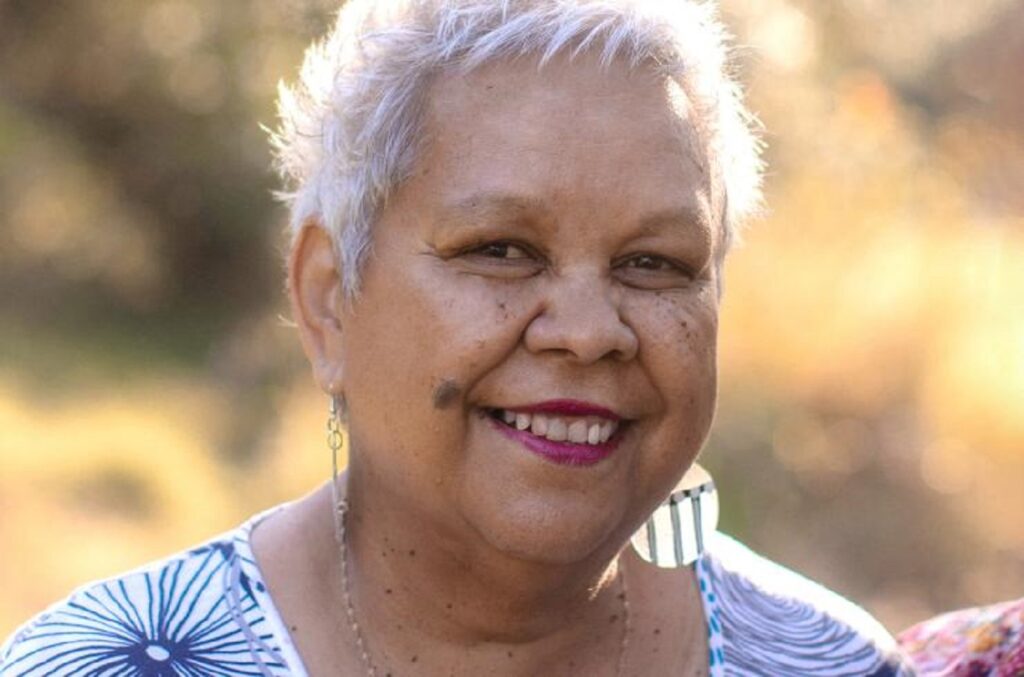Dr Jackie Huggins AM FAHA is a prominent historian, academic and Bidjara and Birri Gubba woman who has devoted her career and lifetime to fighting for an equitable future for Aboriginal and Torres Strait Islander people.
Huggins has spent over four decades pushing for social justice reform in areas of reconciliation, education, prison reform, domestic and family violence, health, housing, literacy and the environment.
She has held roles as the former co-chair of Reconciliation Australia, the national congress of Australia’s first peoples, and co-commissioner into the inquiry of the separation of Aboriginal and Torres Strait islander children from their families (the stolen generation). Huggins was also a participant in the 2017 Uluru Statement from the Heart.
Below, Huggins shares her thoughts on this year’s NAIDOC theme ‘For our elders’, feminism, the upcoming referendum, and her hopes for the future.
What does NAIDOC week mean to you?
Naidoc week means many things to me, but largely it is a celebration of Aboriginal and Torres Strait Islander heritage, culture and resistance. This year’s theme ‘for our elders’ is very apt in recognising the ancestors and elders who have gone before us but also those of us within the community doing our best to keep the injustice that happens to our people at bay.
Who are the elders who have inspired you?
Certainly my mother Rita and her family. In an Aboriginal community we grow up with our mothers, sisters, uncles and aunties as being people who look after all of us; who nurture us and show us the path forward.
On a political level it certainly was Dr Evelyn Scott back in the reconciliation days. I was also mentored by the great Charles Perkins. Many of these elders have now passed so it is time for the next line of us to take our positions. There are so many elders I have been schooled by and I wouldn’t be the person I am today without their guidance.
How do you envision the future of feminism in Australia?
I don’t call myself a feminist, I call myself a “Tiddaist”. Our philosophy is ‘Tiddaism’, just like Alice Walker with her ‘Womanism’ in the United States. Feminism is a term that doesn’t mean much to us, it represents the white woman; women of colour have been excluded. I must say it’s not as bad as it was in the 70s and 80s when I was doing this work. There is now a deeper collaboration with white women and also women with ethnic minority backgrounds. But it’s still a battle. These days I pour a lot of energy into young black women who are coming through the ranks and just passing my knowledge to them.
There are organisations like WOW, Oxfam as well as individual women who have put their hand up for our causes. In particular Dame Quentin Bryce who has spent much in her life to foster the pursuits of Aboriginal and Torres Strait Islander women. Our country has changed since I initially wrote Sistergirl. We are seeing much more diversity and the anglo status of feminism is something of the past now. We should all be included.
What is your advice to Australians who are not in support of the voice? Or are feeling confused about what it aims to achieve?
We live in a democratic society, so of course all Aboriginal and Torres Strait Islander people are not homogeneous. We have different views. I know many of my people have been very let down by past governments, have been neglected, ignored and not heard. So I can really understand the need for them to have greater ambition and want more than an advisory body.
But this is an opportunity we will only have once in our lifetime. It will take generations to get a referendum like this again, to talk about the voice in Parliament and the need to be included in the constitution. We do need to have a mechanism where we can not only hear but implement the voices of our people who have been so neglected for decades and decades.
It was really important for me to know that when the referendum comes around we will all have the opportunity to do something. When our children and grandchildren ask us what did you do, you could say I voted yes. And when I voted yes I chose treaty, self determination and walking together. I chose to help build a greater community amongst us that no longer sees the discrimination we have had in the past towards Aboriginal and Torres Strait Islander people.
We need to tackle these issues and create a world that is fairer for our people. We only need to look at deaths in custody, the prison population, the child protection statistics. We know the systems are not working for us and need to be fixed. By voting yes it will be an opportunity to get elected representatives into Canberra and to talk about these issues. If we vote no, we are voting for the status quo.
What brings you hope for the future of race relations between Aboriginal and non-Aboriginal Australians?
I see a much more honest and truthful collaboration between Aboriginal and Torres Strait Islander people and the wider community. The conversation has changed over the last 15 years around reconciliation. We now see flags flying, welcome to country, Qantas and Virgin do an acknowledgment to the country when we land. And of course the great education that is going on in schools compared to my education learning about the Kings and Queens of England. So there has been great change. That gives me hope.
And what else gives me hope are all those younger educated men and women (both in the western sense and the cultural sense) who are aspiring to do great things to ensure that their generation have a much better experience than my generation and my parents and grandparents generation.


